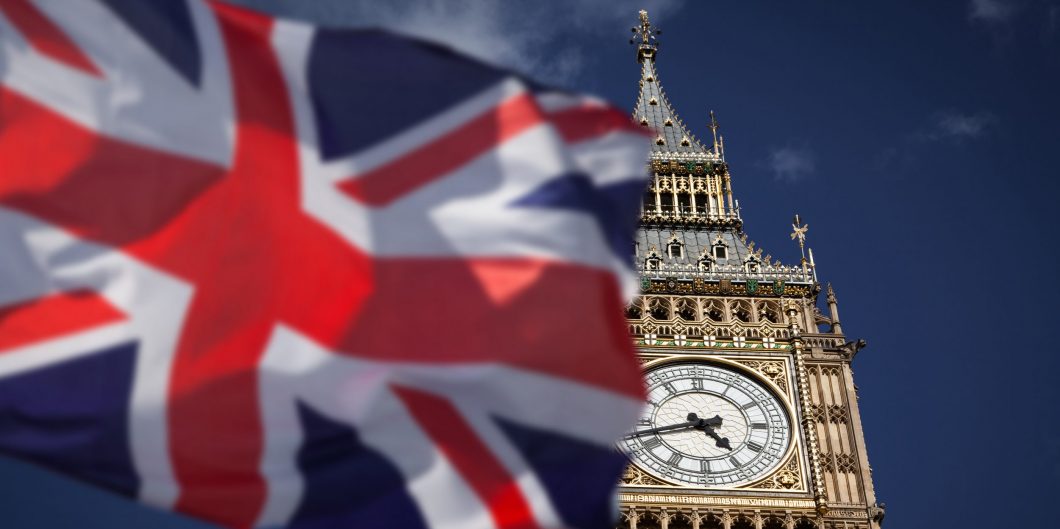The new versions of Star Trek and Star Wars have rejected, but not refuted, the hopes they once entertained.
A Market Economy, Not a Market Society
Five years last Wednesday since the EU referendum.
I was in Australia at the time, working for an Australian senator, and had a postal ballot. I remember distinctly standing for about 10 minutes in front of a red post box in Drummoyne, Sydney, mulling over whether I was casting my ballot for the right choice or even if I should cast it at all.
Little did I know that both my reasons for and my reservations about voting the way I did would be vindicated in such spectacular fashion: The EU’s behaviour during Covid. The unfolding disaster in Northern Ireland. And all the rest of it, the whole cascade of events that keep on coming. The crudest of Leave campaign slogans, cruder than any promises painted on the side of a big red bus—“better off out”—turned out to be true.
This may seem surprising, given that HMGov currently has Gary Giggles from the Spy Kids movies as Secretary of State for Education. And until last Saturday, Blighty had a misplaced McDonald’s Happy Meal toy as Secretary of State for Health. Matt Hancock’s ugly mug should appear beside “caddish hypocrite” in future dictionaries of quotations. Why is it Cabinet is populated by such deeply unserious people?
The answer, I suspect, is rooted in the default opposition to “enthusiasm” common among Brits, for which seriousness is often confused. Hostility to “enthusiasm” has origins in the Wars of the Three Kingdoms and the religious activities of some on the Parliamentary side of that conflict. Come Charles II’s Restoration in 1660, people were not only happy to execute Leveller and Fifth Monarchy Man Thomas Harrison as a regicide. When his sympathisers took ship for the New World, those who stopped home were not disappointed. Unfortunately, a side-effect of seriousness being mistaken for enthusiasm is the presence of amusing but cartoonish Cabinet ministers seemingly incapable of pausing to consider how they look to voters.
Fifth Monarchy Men would wait on hilltops for God to take them up into heaven, a behaviour echoed among modern religious cults (these days, UFOs do the heavy lifting). By this logic, America was the best polity for religious and political “enthusiasts.” Far better for Britain to have its Merry Monarch, a close analogue for the current Prime Minister. Boris is nothing if not boosterish, good-humoured, and sexually profligate.
Seriousness has a place, however, and personal reflection brought about thanks to the Referendum’s five-year anniversary led me to Nick Timothy’s Remaking One Nation: The Future of Conservatism. He really is serious without being enthusiastic, a distinction commentators and reviewers alike have often failed to make.
2020’s coronavirus misadventures had a ruinous effect on publishing, and Timothy’s book was one of the more unfortunate victims. Remaking One Nation deserved to be a bestseller and in a non-pandemic year would have been. Had I written about it in March or April 2020, however, when COVID-19 was deforming the country’s politics and landing Boris Johnson in intensive care, my commentary would not have mattered.
June 2021 is different. The UK has by and large vaccinated its way out of the pandemic, humiliating the European Union in the process. 2020 suspended not only parliamentary scrutiny but British politics full stop, producing a febrile atmosphere where American misadventures made their way across the pond but little else of any note. Now politics-as-normal is gearing up again—erstwhile Health Secretary Matt Hancock falling on his sword is part of that—and Timothy’s effort is as good a place as any to start a conversation. What he writes about is what most of us thought would be the subject of rolling post-Brexit debates as the country sorted itself out. This is still going to happen, just with a 15-month delay.
Timothy’s claim-to-fame—and the reason he got a book deal, to be fair—was his role as joint Chief-of-Staff to Theresa May. He and his fellow joint Chief, Fiona Hill, were widely blamed when May called a disastrous early election and produced a hung parliament, scuppering the small Commons majority she inherited from David Cameron’s 2015 general election victory. Timothy spends the first thirty pages of Remaking One Nation confronting his accusers on this point and, to his credit—while he dumps plenty of ordure on various people around the PM—he reserves a decent-sized bucketful for himself. “I also knew that I had co-authored the manifesto, and the manifesto had blown up,” he says at one stage. “That was why I offered my resignation on election night.”
He soon stops talking about himself—also admirable—and spends the rest of his book first diagnosing what he believes led to Leave winning the Referendum vote, and then setting out a policy programme of his own. This is based partly on his experience and background, and partly on both wide and eclectic reading. If Remaking One Nation has a core argument, it’s that while a market economy is both necessary for prosperity and desirable for individual freedom, a market society is neither of those things, and may be actively destructive of both.
Born into a working-class family in Birmingham, Timothy had a steelworker father and a school secretary mother. (Of note to Americans: Brummies say “mom,” like you do, rather than the “mum” or “mam” common elsewhere in the UK.) With this background, he writes, he “could never have been an ideological liberal or libertarian.”
When Timothy got his start at the Conservative Research Department in the early 2000s, he chafed at attempted indoctrination with Ayn Rand’s political philosophy, whose “selfish individualism left me cold.” Similarly, the story that Margaret Thatcher once pulled Hayek’s Constitution of Liberty from her handbag in Cabinet and declared, “this is what we believe” had him shaking his head. He valued Conservative aspiration and recognised early that Labour had a worrying tendency to keep working-class people “in their place,” but he found libertarian ideas deeply un-British and “rights-talk” both rebarbative and unpersuasive.
In this, the Great British Public agreed with him. Reading his book is to be reminded, repeatedly, how his observations have been borne out by detailed polling and focus group research. British political historian Stephen Davies was one of few who noted that the 2017 Conservative Manifesto was popular. It did not bear fruit until December 2019 simply because First Past the Post occludes the extent to which electors are “lending their votes” to a different political party over several election cycles until constituencies start changing hands. These abrupt shifts notoriously happen all at once, giving the false impression the Great British Public has arisen as a collectivity on polling day to “throw all the bums out.”
Much of Remaking One Nation is a root and branch attack on liberalism. Like many Brits (and even more Australians) Timothy emerges both as a legal positivist (rights are human creations so neither inherent nor universal) and a civic nationalist (where there are rights, they attach to citizenship and impose correlative obligations). He is hard on Islam and sometimes on its adherents, especially those who seek to live under different laws while resident in the UK. He is unafraid to use the word “duty,” drawing on the Godfather of One Nation Toryism, 19th century Prime Minister Benjamin Disraeli. Timothy’s comments about the rule of law hark back to Disraeli’s 1845 observation in his novel Sybil, or the Two Nations.
Two nations; between whom there is no intercourse and no sympathy; who are as ignorant of each other’s habits, thoughts, and feelings, as if they were dwellers in different zones, or inhabitants of different planets; who are formed by a different breeding, are fed by a different food, are ordered by different manners, and are not governed by the same laws: the rich and the poor.
Disraeli famously built a coalition of top hats and cloth caps against the Liberals, expanding the franchise and appealing to his new electoral base with a blend of patriotism and social reform.
Timothy’s strongest claims concern citizenship and community. He argues citizenship is not just a transaction but an obligation, a duty to be part of something. Liberals (of all stripes, both right and left) have not, he says, understood how the nation-state matters. Too often, they expect people to act as rational individuals who subscribe to universal and transnational ideals of conduct. This leads to both intolerance at home and the facile belief that liberal democracy can be exported abroad.
If you are a liberal (of any stripe, including a liberal Tory, like me), Remaking One Nation will give you a right old poke in the eye. Yes, Timothy is careful to draw distinctions between what he calls “essential liberalism” and “the ultra-liberal ratchet,” but he also cheerfully sets about picking apart liberalism’s internal contradictions in a way normally associated with critiques of Marxism or Postmodernism.
Of note is his observation that essential liberalism—the liberalism necessary to prevent democracy from descending into crude majoritarianism—does not seek to produce a general theory of rights or attempt to harmonise human interests and values. The ultra-liberal ratchet, however, is avowedly teleological, arguing for pluralism and tolerance purely on the basis that the trial and error they engender lead to truth and progress.
The problem with this, of course, is the assumption that it’s possible to get everyone to line up and face in the same ideological direction after a period of experimentation and debate. Relatedly, it’s rarely the case that discovering true things about the world can be combined with a widely accepted moral principle to produce a single, uncontested policy prescription. Timothy rejects wholesale the belief that, if only facts were clear and proven, playground morals would show us the way.
Even if the UK had not admitted a single Pakistani Muslim or conservative Nigerian Christian immigrant post-1945, polls consistently show around 10 per cent of the white British population does not think men and women are equal or that homosexuality should be legal. Narrow but clear majorities support the death penalty. What’s a teleological liberal to do then? Timothy’s response is reliably Tory: understand the difference between tolerance and acceptance and stop with the Whig History and its myth of continuous progress.
Timothy’s strongest claims concern citizenship and community. He argues citizenship is not just a transaction but an obligation, a duty to be part of something. Liberals (of all stripes, both right and left) have not, he says, understood how the nation-state matters. Too often, they expect people to act as rational individuals who subscribe to universal and transnational ideals of conduct. This leads to both intolerance at home and the facile belief that liberal democracy can be exported abroad. If Timothy is hard on immigrants for failure to integrate, he is even harder on liberal internationalism and its concomitant military adventurism. War over there, unwanted refugees over here, in short. “Think of how quickly, in America, the use of torture was justified in the name of pacifying Iraq,” he observes drily, “a country the US had invaded in order to deliver democracy.”
Coming late to Remaking One Nation, as I have, proved beneficial in another respect, too. It is possible to count up how many of Timothy’s policy proposals Boris Johnson has implemented. There are a lot of them, coronavirus notwithstanding, and more coming down the pike.
I leave you to read the book and discover what they are.


